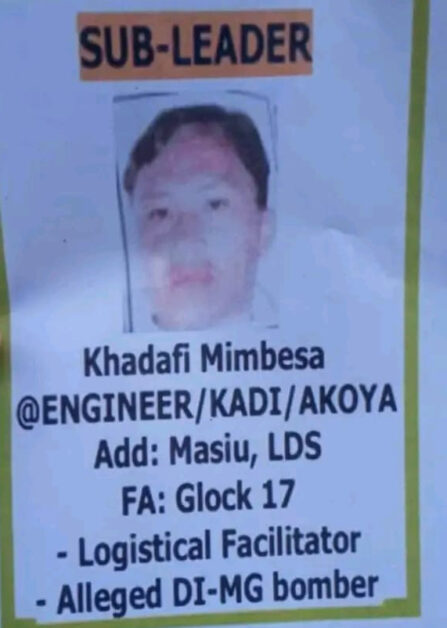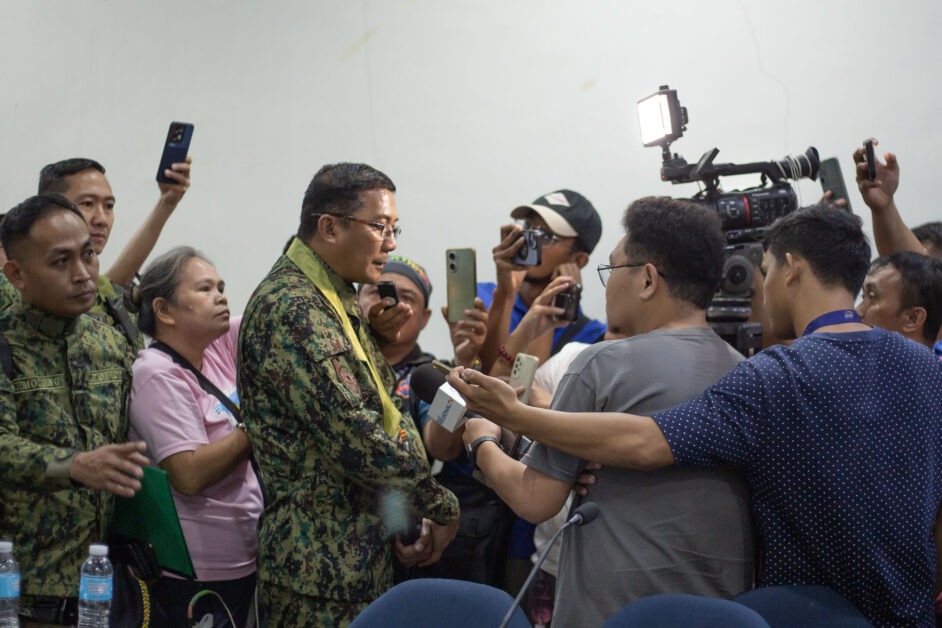 Source: PNP
Source: PNP
COTABATO CITY (MindaNews / 4 December) – The Philippine National Police has identified a “person of interest” behind the explosion at a Catholic mass celebration inside the main campus of the Mindanao State University in Marawi City (MSU-Marawi) on Sunday, December 3.
In an assessment report made public Monday, authorities released the sketch of the suspect identified as Khadafi Mimbesa, a resident of Masiu, Lanao del Sur who uses the aliases Engineer, Kadi and Akoya. He is allegedly a bomb expert and sub-leader of the Dawlah Islamiyah Maute Group operating in Lanao del Sur.
The Special Investigation Task Group or “SITG-MSU Dimaporo Gymnasium Explosion” has been activated, headed by Col. Robert Daculan, Lanao del Sur police director.
 PNP Chief Benjamin C. Acorda Jr. gets swarmed by reporters at the provincial capitol in Lanao del Sur during his visit to Marawi City to check on the MSU bombing on Sunday (3 December 2023). MindaNews photo by BOBBY TIMONERA
PNP Chief Benjamin C. Acorda Jr. gets swarmed by reporters at the provincial capitol in Lanao del Sur during his visit to Marawi City to check on the MSU bombing on Sunday (3 December 2023). MindaNews photo by BOBBY TIMONERA
An improvised explosive device fashioned from a 60mm mortar was used in the attack, according to the assessment report.
Four individuals were killed and at least 42 others were injured in the incident.
The report noted that the bomb attack could have been “in retaliation to the relentless military operation to topple ISIS-inspired terror groups operating in Mindanao.”
First, it cited the deaths of 11 alleged members of the Dawlah Islamiyah in Datu Hoffer Ampatuan, Maguindanao del Sur, who were killed in an air and ground assault launched on Friday, December 1. Their remains were found on Saturday during clearing operations. Among those killed was their newly installed chief identified only as Kumander Sapal.
Second, was the death of Abu Sayyaf leader and the alleged mastermind of the 2019 Jolo, Sulu church bombing, Mudzrimar Sawadjaan, aka “Mundi.” He was killed in a military operation in Tuburan, Basilan on December 2, after escaping Sulu to avoid military operations against him.
And third, the death of Dawlah Islamiyah Maute Group sub-leader Alandoni Macadaya Lucsadatu, alias Abu Shams, in Piagapo, Lanao del Sur at 1 a.m. Sunday, December 3, hours before the bombing inside MSU-Marawi.
The Council on Climate Conflict and Action Asia (CCCA), a non-government organization monitoring conflicts in the Philippines, expressed concern of attempts to polarize the situation and sow the seeds of a Muslim-Christian conflict.
“Our Early Response Network has already reported an alarming rise in calls for revenge and hate speech on the ground and social media,” CCCA said in a statement.
Bangsamoro Interim Chief Minister Ahod “Al Haj Murad” Ebrahim also appealed to the public to use social media responsibly and to refrain from fueling conflict and divisiveness.
“So far there is a good co-existence between Christians and Muslims at MSU-Marawi. We call on everyone and the netizens not to spread hate on social media and instead help strengthen unity amid these trying times,” Murad told reporters here.
Murad admitted that there were lapses in monitoring on their side, but assured that “this will not happen again and would work to strengthen more efforts in security.”
Minister of the Interior and Local Government Atty. Naguib Sinarimbo, also the spokesman of the Bangsamoro government, said that they are working to sustain and strengthen a community resilience program in the region.
Sinarimbo, who worked behind the crisis management during the five-month Marawi Siege in 2017, designed this program under MILG-BARMM to strengthen and create better and wider understanding to combat violent extremism in communities, aside from strengthening security efforts.
“The aim of the program is to make people understand the wrong ideologies infused by some sectors, and the wrong interpretation of religious teachings that must not be accepted by the community,” he said. (Ferdinandh Cabrera / MindaNews)
